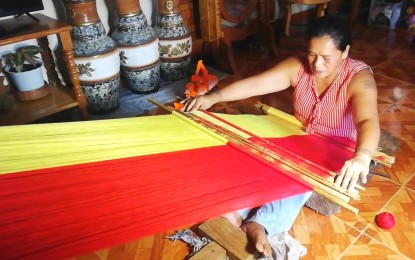
TRADITIONAL PRACTICE. Weaving like in this photo taken in Lubuagan, Kalinga in the first week of Oct 2023 is among the cultural practices of the people in the Cordillera Administrative Region, which is being preserved through the inclusion of lesson about this in schools in Lubuagan. The National Commission on Indigenous Peoples (NCIP) is helping preserve culture by making the youth who avail of the scholarship programs of the government participate in activities where they learn the culture and pass the same to others. (PNA file photo by Liza T. Agoot)
BAGUIO CITY – Khyru Egyab, 25, of Sagada, Mountain Province is a first-year Bachelor of Science in Criminology student who is all hopes for his future in law enforcement.
He is a new member of the National Commission on Indigenous Peoples (NCIP)-Cordillera’s dance troop. Being part of this group is what he considers as a factor that will help him land a scholarship grant from the government just like the thousands who were able to go to school, finish a degree, and are now reaping the benefits of the program.
Wearing the traditional “Ba-ag” (g-string) on the sidelines of the culminating activity of the Indigenous Peoples month celebration in this city on Thursday, Khyru said he commits to helping teach the Cordillera culture to the youth through dance.
“I also want to be a scholar so that I will have money for tuition fees,” he said in Ilocano, the local dialect.
Khyru said he learned their native dance when he was 15 years old, after seeing the elders in his community in Barangay Tetep-an when they do rituals, play the gong, and move in circular motion at the “Dap-ay” or the “Ator”.
The Dap-ay is a place in the community that was made using rocks placed together to form a circle where elders conduct meetings to discuss community issues.
“I love watching them with the thought that the culture continues to live. I studied it and will pass it the way it was passed on to me by the elders who continue to practice our culture,” Khyru said.
Lawyer Atanacio Addog, regional director of the NCIP-CAR, on the sidelines of the event said the government, through the NCIP, allots 825 scholarships for the youth in CAR.
“Cordillera alone has an allocation of 825 under the Education Assistance Program (EAP) of the Commission which is spread in different provinces. A lot have graduated since the institutionalization of the scholarship in 2001,” he said.
Grantees receive a PHP10,000 cash allowance per semester, on top of the cash assistance for those whose courses have board examinations or when the student needs to undergo review program before taking the government-led examination.
“Education is very important to us but is expensive that is why our students exert effort so that they can be educated. Although we give a minimal amount for the scholarship, it goes a long way for the expenses like purchase of books and school allowance,” Addog, also an IP being a member of the Aplai Tribe of Besao, Mountain Province, said.
He explained that the 825 scholarship is maintained since new scholars will have sure slot once someone graduates. CAR’s annual allocation is PHP4 million.
“Culture is passed on by practice, word of mouth, and not written. That is why the youth must learn the culture so that it will continue after the old people are gone,” he said.
He said that as scholarship grantees, the students must go back to the community, participate, and be involved especially during occasions where there are activities that involve cultural preservation.
He said youth grantees are also being tapped by NCIP as links to their communities, on top of the identified Indigenous Peoples Mandatory Representative (IPMR).
Passing on the Indigenous knowledge
Addog said the Commission on Higher Education has added the Cordillera Heritage 101, a three-unit subject in state universities in the region that teaches about Cordillera’s history.
He said the Indigenous Knowledge System and Practices (IKSP) is not just in the community anymore but in the formal educational system.
For the elementary level, he said the Indigenous Peoples Education (IPEd) has been incorporated in the curriculum and NCIP is working with the education department to further boost the programs.
“Continue to be proud as Cordillerans, to be proud to represent your ethnographic or ethnic group. Let us not be ashamed. Let us be a medium of education to correct the misconceptions, the wrong information about us, the IPs,” the director added. (PNA)
